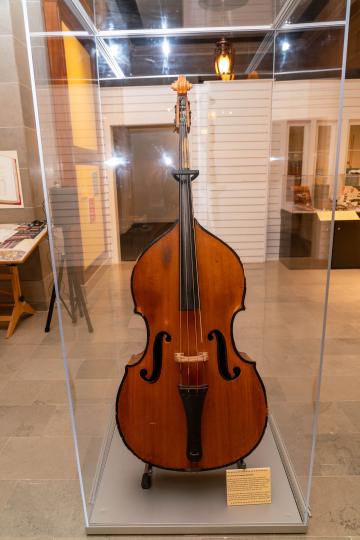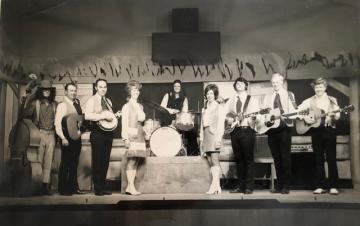
JEFFERSON CITY, MO, JUNE 15, 2023 – In August 2022, legendary Missouri entertainer Lee Mace’s bass fiddle was put on display at the Missouri State Museum in Jefferson City. Mace founded the Ozark Opry in Osage Beach and went on to nearly become a household name in the popular vacation spot. But there’s a missing part of the instrument’s history, which leads to how it ended up in the museum.
The bass was built in 1938 and used by Mace until sometime in the 1950s, when he sold it to another musician, Kenneith Pitts, who owned it until the early 1990s. But, not even Pitts’ family knew the instrument had belonged to Mace until it was put on display in the Missouri State Museum last year.
When she first heard that the bass was in the museum, Becky Reynolds, Pitts’ youngest daughter, was skeptical that it was the same instrument her father had played for more than 30 years. But, after seeing that the marks on the bass perfectly matched those shown in old photos of her dad, Reynolds was convinced.
In 1964, Pitts started a show that was inspired by Mace’s Ozark Opry, called the Pomme De Terre Opry. Pitts and his band first performed in a green and white-striped tent in Nemo, Missouri, before moving to a building by the dam at Lake Pomme De Terre. The performed there from 1971 until the show closed in 1988.
Much like Mace, Pitts aimed to draw families by providing appropriate entertainment for all ages. The show would start with Pitts and his band playing a set of country standards by artists like Merle Haggard and Patsy Cline. After a brief intermission, Pitts would come back out on stage having removed his dentures, wearing a hat, silly wig and a pair of brightly checkered pants, to do stand-up comedy as his character, Herman Sneezleweed. In character, Pitts would do a series of clean, witty jokes with a put-on nasally voice, true to the character’s spirit.

“I don’t know where he decided to do that,” said Kay Martin, Pitts’ oldest daughter. “I know that I’ve never thought of my dad being a comedian, because he was always so dry. He was like a different person when he dressed up as Herman Sneezleweed.”
To close each show, the band would go back on stage and play a gospel song, often “I’ll Fly Away,” to send the crowd home.
“Having grown up in the 1960s, I was more of a rock music fan at the time,” said Reynolds. “But, I look back fondly on the music my dad and his band performed. Every time I hear that song, I break down and cry.”
When he wasn’t playing music or doing stand-up, Pitts was a father of four and worked in farming, carpentry and construction. He also served in the South Pacific during World War II, earning a Purple Heart.
Pitts developed Alzheimer’s disease shortly after closing his show in 1989 and died in 1994. Reynolds said the disease likely played a role in her dad’s getting rid of the instrument, a decision her mom, Virgia, was particularly upset about.
The buyer was a mystery at the time. However, after the bass was displayed in the museum in 2022, Pitts’ family learned from a family friend that Pitts had actually sold the instrument back to the Mace family. After 30 years of uncertainty about the bass fiddle’s location, Reynolds and Martin were shocked when the bass turned up in the Missouri State Museum in Jefferson City.
“In the many years I was around all that music and all those people, it was never mentioned to me that my dad had gotten the bass from Lee,” Reynolds said. “I’m proud the bass is now in the museum. I thank the Mace family for that and I’m thrilled it’s there,” Martin said.
To see the bass fiddle and exhibits like it, visit the Missouri State Museum inside the Missouri Capitol in Jefferson City.
For more information on state parks and historic sites, visit mostateparks.com. Missouri State Parks is a division of the Missouri Department of Natural Resources.
